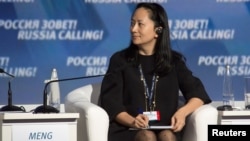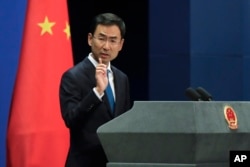Chinese authorities and telecom giant Huawei have reacted swiftly to indictments U.S. federal prosecutors announced against the company and its chief financial officer Meng Wanzhou.
Meng’s lawyer has argued she is being used as a “pawn or hostage” in the relationship between the United States and China, while China’s Foreign Ministry says the case is part of a “unreasonable suppression” of Chinese companies.
On Monday, the U.S. Justice Department charged Meng with conspiring to violate U.S. sanctions on Iran for doing business through a subsidiary it denied was connected to the company. The indictment alleges Huawei, Meng and other employees engaged in a conspiracy to “deceive numerous financial institutions and the U.S. government regarding Huawei’s business activities in Iran.”
Separately, the company has been accused of stealing technology from telecommunications carrier T-Mobile US.
In a statement, Huawei denied all the charges leveled against the company and said it was “disappointed” with the allegations. The statement also said the company had previously sought to discuss the accusations with the U.S. Justice Department, but that request had been rejected “without explanation.”
In comments to Reuters, Meng’s lawyer, Reid Weingarten, partner at Steptoe & Johnson, said she “should not be a hostage” or a “pawn” in U.S.–China relations.
“Ms. Meng is an ethical and honorable businesswoman who has never spent a second of her life plotting to violate any U.S. law, including the Iranian sanctions," he said in a statement to the news agency.
Foreign Ministry spokesman Geng Shuang called on the United States to stop what he called its “unreasonable suppression” of Chinese companies including Huawei and treat them fairly and objectively.
“The U.S. has used its state power to discredit and pressure designated Chinese companies, attempting to throttle their ordinary legal operations. Behind all of this there are very strong political intentions and manipulations," Geng said.
Some have argued Washington is using the case to block Huawei out of the race for leadership in next generation wireless technology or 5G. Others, that the case is linked to the trade war or both.
U.S. officials have denied there is any connection between the case and the ongoing trade dispute with Beijing, but President Trump previously said he could intervene in Meng’s case if it would benefit the United States’ national security interests or help secure a trade deal with China.
Commerce Secretary Wilbur Ross has said the charges are “wholly separate” from the trade negotiations.
Meng is currently being held on bail in Canada awaiting possible extradition to the United States. The unsealing of the indictments against Meng and Huawei are part of that process. Once Canadian authorities receive a formal request they will have another 30 days to review, but the extradition process is typically long. The entire process could take months, if not years, legal analysts note.
The deadline for the United States to submit its formal request comes just as Chinese and American officials are to meet this week in Washington.
China’s top trade negotiator, Vice Premier Liu He, arrived Tuesday in Washington, not long after the indictments were unsealed.
Jean-Pierre Cabestan, a political science professor at Hong Kong Baptist University said for now China is likely to continue to keep the two issues – trade and Huawei - separate. It is unlikely that Liu He would leave the talks and come home empty handed, Cabestan said.
“That would be even more disastrous for Liu He and for Xi Jinping who has been under attack recently from a number of angles, including his lack of flexibility regarding the trade war,” he said.
“They have to bring back results to China,” to convince the domestic audience they are making progress on the trade dispute and that it is not going to derail the economy, he adds.
On the tech race front, Huawei is well positioned to be a leader in the contest to roll out 5G technology and says it already has 30 contracts – more than any of its competitors. But the allegations against Meng and the company, as well as security concerns that its equipment could be used by China’s government for espionage, has a growing number of countries banning or considering banning Huawei equipment from their networks.
Huawei has brushed off those concerns repeatedly and said it puts its customers’ interests first.





